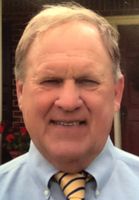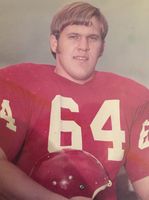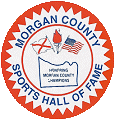2018 INDUCTEE - JOE WEAVER
By David Elwell
The Decatur Daily
 Joe Weaver likes to take long walks around his property off Bud Weaver Road.
Joe Weaver likes to take long walks around his property off Bud Weaver Road.
The walks give him time to think about the past, present and future.
The past includes being a star football player for the Hartselle Tigers in the 1970s. He was good enough to receive a football scholarship from the University of Alabama and Coach Paul "Bear" Bryant.
Weaver became a high school football coach after college. He was an assistant coach at Hartselle during the winningest decade in school history. The Tigers went 87-33 during the 1980s with seven region championships and advanced to two state championship games.
The present is Weaver's upcoming induction into the Morgan County Sports Hall of Fame on May 5.
The future is where Weaver's friends hope his unique story is preserved for future generations.
"I want people to take away from the Joe Weaver story that sometimes life doesn't go the way you want it to go," Jim Eidson said. "There's a plan for everybody, but sometimes the plan for you is difficult to accept. When you can accept it and make the most of it, to me that is a true champion. Joe Weaver is a true champion."
Weaver and Eidson were best friends growing up in Hartselle. It was fitting that they lined up next to each other in the Hartselle offensive line when they were seniors in 1971. They helped pave the way for running back Conley Duncan.
Signing day after the 1971 seasons was a landmark occasion for Hartselle. It was the only time the football program ever had three players sign with SEC schools. Alabama took Weaver and Duncan. Eidson signed with Mississippi State.
"Our head coach Bucky Pitts told me during my junior season that some colleges were looking at me," Weaver said. "He thought I was capable of at playing at a high level."
When Weaver got to Tuscaloosa he was ready to perform at a high level. Alabama had converted to the run-oriented, triple-option offense called the Wishbone in 1971. The change to the ground attack meant the Tide needed bigger, more physical offensive linemen. Weaver at 6-foot-2, 235 pounds fit the bill.
"Back then freshmen could not play on the varsity," Duncan said. "We had a freshmen team with its own schedule of games. Joe was one of the best linemen on that freshmen team. He showed he was ready to make an impact on the varsity the following year."
After spring practice, Weaver was in the top group of offensive linemen.
"The way we ran the ball they wanted two to three groups of linemen ready to go 60-65 plays a game," Weaver said. "There were a lot of good linemen on that team. It was guys like Larry Ruffin, Steve Sprayberry, Buddy Brown and Sylvester Croom."
Weaver returned to school in August ready to start pre-season practice. One day he arrived at his locker to see a note that said he needed to go to Bryant's office.
"When you were told to report to his office it was like being called by God," Weaver said.
Bryant had bad news. A physical showed that Weaver had high blood pressure. The fact that his father, Bud, died of a stroke when Joe was 13 raised concerns.
 "Coach Bryant told me the doctors thought it was too risky," Weaver said. "One of my first thoughts was about school. I didn't have the money to go to college. Coach Bryant said not to worry about my scholarship. He said the school would still honor it."
"Coach Bryant told me the doctors thought it was too risky," Weaver said. "One of my first thoughts was about school. I didn't have the money to go to college. Coach Bryant said not to worry about my scholarship. He said the school would still honor it."
Weaver went through testing trying to determine a cause for his high blood pressure. No cause was found. He was prescribed medication that he continues to take each day.
In what would have been Weaver's three seasons on the Alabama varsity, the Crimson Tide posted three 11-1 seasons. Alabama lost to Notre Dame in the 1974 Sugar Bowl, the 1975 Orange Bowl and beat Penn State in the 1976 Sugar Bowl.
"I continued to live in Bryant Hall (the athletic dorm)," Weaver said. "It was not easy being around friends and teammates when they were having all this success while I couldn't be part of it."
Duncan was an All-SEC linebacker. Eidson starred at Mississippi State and played in the NFL with the Dallas Cowboys.
Weaver would graduate with a degree in sociology. When it became time to pursue a career path, football called him back.
"I guess I had never got football completely out of my system," Weaver said.
Weaver coached at Austin and in Huntsville before landing back at Hartselle in 1980 on Don Woods' coaching staff. During the next 10 years when Hartselle averaged nine wins a season, the Tigers produced a long line of great linemen like Kendrick Burton, Jim Littrell, Brett Nance, Marlin Chapman and Jerry Vandiver.
After several years in administration, Weaver retired to have more time for long walks.
"What I went through in college wasn't pleasant," Weaver said. "I had worked hard to get to a point where I could compete at the highest level of football and just like that it was gone.
"I never wanted people to feel sorry for me. There was really no need to think about what could have been. Life has been good."
